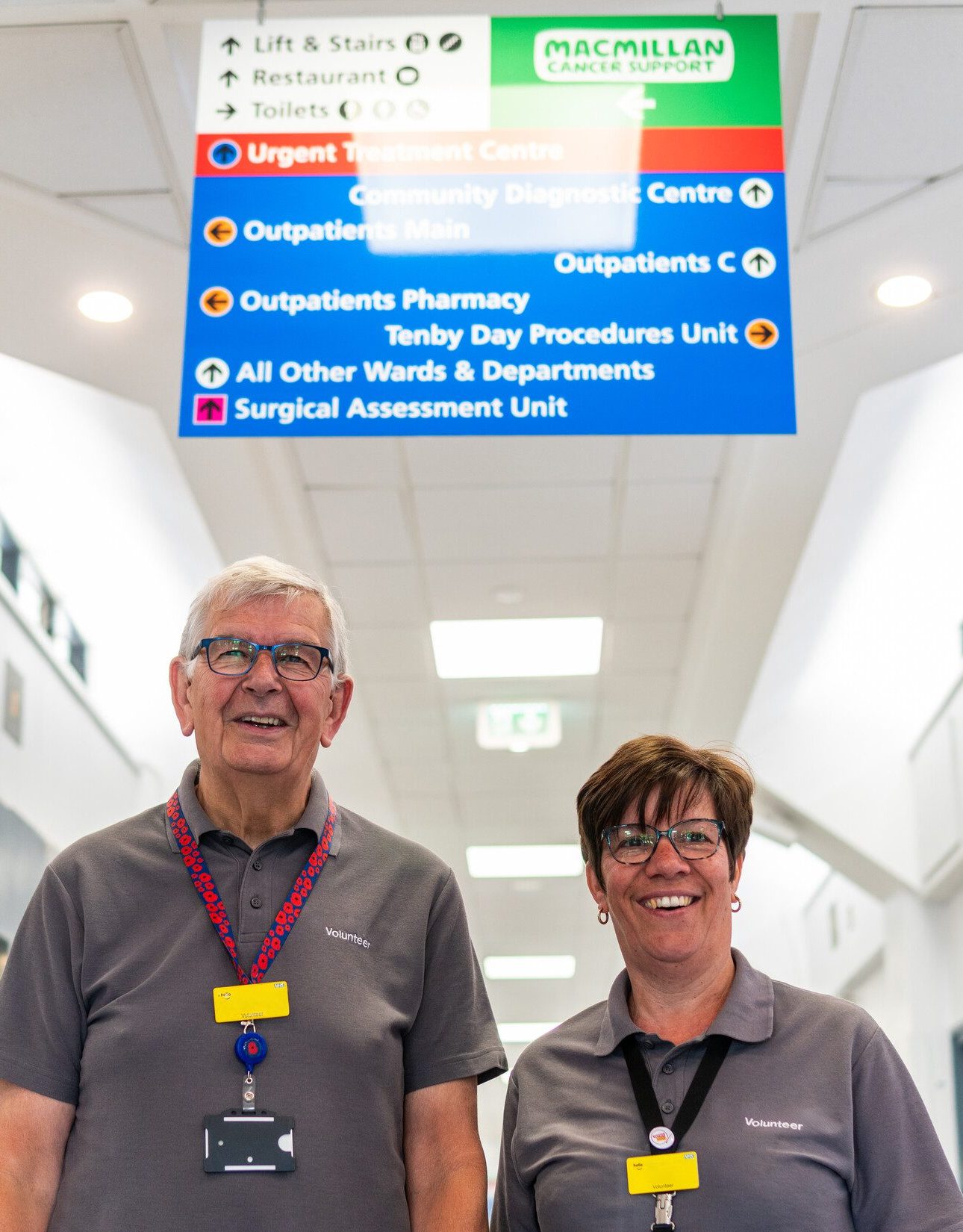Introduction
Most of us stay in hospital at some time in our lives. This might be planned, for example, if we need an operation that isn’t urgent. Or it may be as an emergency if we are unwell or have an accident.
People living with dementia and their families tell us that a hospital stay (admission) can be particularly difficult to cope with. You might find the hospital ward hard to get used to, or you may have to make important decisions about your treatment and care. Although we know that a hospital stay can be difficult, we share some tips that could help make your experience better and help you get the right care and support you need in hospital.
I told the nurses “I have dementia, you will have to keep reminding me the way to the toilet because I forget. I have no problem getting to the toilet or using it, but I do forget where it is. That helped them to remind me and put my mind at ease.
Geoff, Living with Dementia.
Although there may be many things about your time in hospital that you are not able to change, there are things you and those who support you can do to help make your time in hospital better. There are things you can do to prepare for a hospital stay which can help to reduce your stress and improve your care in hospital.
Dementia UK have a helpful information sheet to help you to plan for and manage going into hospital.
Managing the hospital environment
When you are admitted to hospital you may meet lots of different hospital staff including nurses, healthcare assistants, porters and doctors. Dealing with new people in an unfamiliar place can be tricky at any time. If you are unwell this can be even more difficult to cope with and can get confusing. It can be difficult to remember who knows what information about you. So, people may not realise you have dementia and you may need extra support.
Some hospital staff may not understand dementia well. They may not understand that you might need information written down or might need extra time to make choices. Letting people know about your dementia may help them to understand that you need extra support. You can wear a sunflower lanyard or carry a card to show people. This can help them to understand that you might need more support while you are in hosptial.
If you think hospital staff do not understand dementia or are ignoring your dementia or treating you differently because of your dementia, tell someone as soon as possible. Talk to one of the doctors or nurses on the ward. You could also tell a family member or friend. This might be when they visit you or if they are unable to visit you might want to call them and explain how you feel. Hospitals can offer advice through their Patient Advice and Liaison Service (PALS) who can help offer advice and support with concerns about your care and treatment.
To help people to understand how to help you and what you need what you need , you might find it helpful to write down information about yourself. This is me is a helpful booklet you can fill in to help you share important information with lots of people. There is also a Welsh version of this booklet.
Staying in the hospital ward
You might stay on a hospital ward with several people in the same room. Hospital wards can be busy, loud and confusing. Toilets may not be well signposted, and you may be asked to order your meals in advance (for example choosing your evening meal at breakfast time). You may not be able to see out of the window or see a clock so it can be difficult to work out where you are, what day it is and the time. Here are some tips that might help you on the ward:
- Use things to help you to keep track of the days and time. This might be a newspaper, a smartphone, diary or portable clock. Some clocks can even remind you of the day, month and year and whether it is day or night. The Alzheimer’s Society shop offers a range of clocks.
- If there is an outdoor area or day room with windows it might help you to spend some time there instead of on the ward. You should be free to move around the ward and this should not be seen as “wandering” and a symptom of your dementia. You can always ask at the nurses station of it is ok for you to leave and return to the ward.
- If you have a friend or relative who visits you, ask them to help you choose what food you would like. If you need help eating or drinking, let the staff know.
- Remind the staff that you have dementia and may need extra support.
- Usually above your bed there is a whiteboard for important information. Ask the staff to write on important information for the doctors and nurses.
- Keeping occupied can help you to pass the time and keep your brain active by reading, doing puzzles, watching quiz shows on TV, or other pastimes you can do in bed or in a chair may help you to relieve any stress or boredom. Make sure that you have access to your glasses if you need them.
- Put up pictures of your family, friends and pets to remind you of your favourite people and places.

Start your own dementia toolkit

Making decisions in hospital
Whilst you are in hospital you might have to make decisions about your treatment and care. These could be everyday decisions such as choosing your meals or big decisions about your treatment and going home from hospital. If other people usually help you to make decisions, they may not be there at the time due to visiting hours. Read more about Making plans and decisions here.
You may have plans in place for decisions about your health and care. Someone you trust may have Lasting Power of Attorney for Health and Welfare if you live in England or Wales. There are other legal arrangements for Scotland and Northern Ireland. Read more here about legal plans and making decisions in Planning Ahead.
Talk to a senior nurse or doctor and let them know that a relative, friend or other trusted person will need to be with you if you need to make important decisions about your treatment, care or going home
Having a general anaesthetic
Not everyone in hospital has a general anaesthetic. If you need an operation, you may be offered a general anaesthetic. This means you will be unconscious throughout the operation. There is mixed evidence about whether having a general anaesthetic can make dementia worse. It may be a good idea to talk to your doctor (GP) and hospital doctor about this. They can talk to you about what might happen and may be able to offer you a different type of anaesthetic to prevent any pain or discomfort. Dementia Australia have a help sheet to answer common questions people have about how a general anaesthetic might affect their dementia.
Getting your dementia diagnosis in hospital
For some people who have noticed changes in their memory and thinking, being in hospital might be when dementia is first diagnosed. This can be a lot to take in and may be a shock to you. If this happens to you, talk to the hospital staff about getting support to understand your new diagnosis. You can also read more about understanding your dementia diagnosis here. Also ask the hospital staff to talk to your family or friends about this when they visit the ward.
If you are diagnosed with dementia when you are in hospital, they should let your usual doctor (GP) know, but you might find it helpful to make an appointment to talk to your doctor about it when you leave hospital.
Going home
When you are recovered from your operation, injury or illness you will be discharged from hospital. For some people, hospital discharge is straightforward and they return home once they are well and able to manage.
Other people may need some support when they return home. This might mean someone coming in to help you each day, or it could be making some changes to your home such as having safety equipment put in. An example might be grab rails to give you extra support on steps or in the bathroom.
You may be entitled to free support. Read about Getting started with social care to find out what you might be entitled to.
You might have a meeting with a hospital Discharge Co-ordinator or a social worker to talk about going home and any help you might need. The hospital staff will arrange this. You can ask your family or friends to attend this meeting with you. An occupational therapist might need to visit your home with you before you leave the hospital to see how you manage and if they can help you to adapt your home to make life easier. For some people, returning home may not be possible and they may need to think about other arrangements such as staying with a relative or moving into care.
Find out more about getting care and support at home or about other care options here.
Take action
List what you would like to take to hospital
Think about the things you would take to hospital with you to make your stay more comfortable. Write a list and share this with someone you trust.
Complete your This is Me booklet
Fill in the This is me booklet, so that if you are admitted to hospital you have information you can share with the hospital staff.
Have a copy of important legal plans
Keep a copy of any legal plans you have in place for making decisions about your health and welfare and share these with the medical staff. This will help make sure the right decisions are made about your treatment and care in hospital and your discharge plans too.






